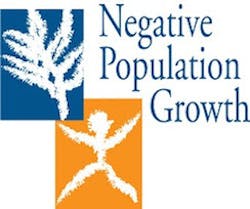NPG to Release New Forum Paper
Alexandria, VA (October 28, 2014) — In response to a disturbing essay recently published in The Wall Street Journal, Negative Population Growth (NPG) will release a new Forum paper on November 4th. Highlighting ongoing global population growth, the new paper flatly rejects the cornucopian position that the world can “think” its way into renewed supplies of rapidly-dwindling natural resources. (You can read the WSJ opinion piece HERE).
In the new publication, NPG Special Advisor Leon Kolankiewicz draws on three decades of professional experience as an “all-around ecologist” to demonstrate that there are, in fact, definite limits to earth’s non-renewable natural resources. Characteristically witty and sharp, Kolankiewicz dispels the assertion that these supplies “come out of our minds.”
Kolankiewicz clearly illustrates the consensus of scores of experts — including geologists, former NASA scientists, billionaire oil tycoons, U.S. government agencies, environmental non-profits, and a host of scientific journals: when it comes to our seemingly-endless supply of natural resources, “the party’s over.”
Kolankiewicz notes: “Oh how I wish I could share the cornucopians’ “˜don’t worry, be happy’ mindset, but I would have to disregard the dour conclusions of disinterested scientific investigation.” His analysis goes beyond the obviously diminishing fossil fuel supplies, taking note of resources that are non-renewable within a human lifetime — such as fertile soil (lost to erosion and over-development) and fresh water (over-exploited by industry and the demands of agriculture for a growing population).
Echoing NPG, Kolankiewicz recognizes the critical need for a reduction of population to an ecologically-sustainable size, urging the complete rejection of the call to “grow with reckless abandon until nature itself cuts us down to size.” He finds that we must “disabuse ourselves of obsolete and mistaken mythology” which directs us toward endless growth — and the false promises of boundless resources.
NPG President Donald Mann had strong praise for Kolankiewicz’s work, noting: “While most Americans have embraced the idea of limited natural resources, the vast majority still have not recognized the root cause of the problem. At over 319 million people, the United States is unsustainably overpopulated — and we are continuing to grow by an average of over 2 million people per year. Even with the wonders of modern technology, there are limits to our resources.” Mann added: “By distributing Kolankiewicz’s perceptive work, NPG hopes the reality behind resource scarcity will reach more Americans: we must slow, halt, and eventually reverse U.S. population growth until we reach a much smaller, truly sustainable level.”
Founded in 1972, NPG is a national nonprofit membership organization dedicated to educating the American public and political leaders regarding the damaging effects of population growth. We believe that our nation is already vastly overpopulated in terms of the long-range carrying capacity of its resources and environment. NPG advocates the adoption of its 10 Principles for a Responsible U.S. Population Policy, with the goal of eventually stabilizing U.S. population at a sustainable level — far lower than today’s. We do not simply identify the problems — we propose solutions. For more information, visit our website at www.NPG.org.


